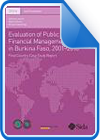Evaluation Team
Authors: Mary Betley, Andrew Bird, Adom Ghartey, Joint Evaluation 2012:8, Commissioned by Sida, Danida and AfDB, Date of final report: June 2012
Objective
The evaluation aims to address two core questions presented in the Terms of Reference:
a) Where and why do PFM reforms deliver results (i.e. improvements in the quality of budget systems)? ; and
b) Where and how does donor support to PFM reform efforts contribute most effectively to results?
Main Findings
- Three factors have been crucial to the success of Burkina Faso’s PFM reforms: a) A clear and sustained political commitment to the PFM reform process; b) A strong framework for driving the implementation of reforms and for their technical coordination and c) A structured framework for channelling donor support to the programme, monitoring progress and managing dialogue with external and domestic stakeholders
Main Lessons
- It is a common mistake to perceive Public Finance Management (PFM) reforms as purely “technical” measures and this perception needs to be corrected so that there is wide political support for the reform. Also opposition policticians should be sensitised to ensure continuity PFM reforms, in the event of a change of Government.
- For a Public Finance Manangement reform to succeed, it is important that those responsible for coordinating reforms have both technical competence and authority; also the right location of the authority is important. Where the technical secretariat reports directly to the Minister of Finance rather than the Presidency or the Prime Minister's office is a good one.
- The unification of responsibilities for attracting and managing external support to Public Finance Management reform with those for coordinating implementation by the departments and institutions of Government helps to ensure a strong alignment of external support to domestic priorities.
File(s):


